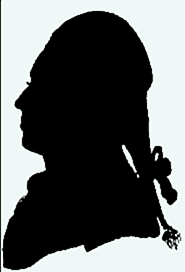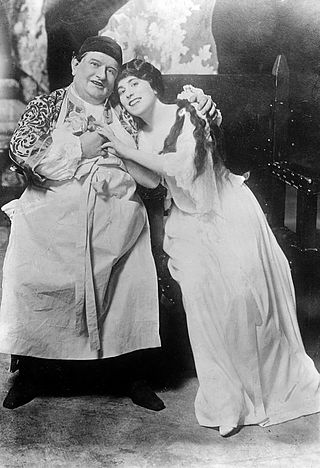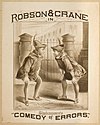
La clemenza di Tito, K. 621, is an opera seria in two acts composed by Wolfgang Amadeus Mozart to an Italian libretto by Caterino Mazzolà, after Pietro Metastasio. Mozart began the work while he was finishing Die Zauberflöte, the last of his principal operas. La clemenza di Tito premiered on 6 September 1791 at the Estates Theatre in Prague.

Stephen John Seymour Storace was an English composer of the Classical era, known primarily for his operas. His sister was the famous opera singer Nancy Storace.

Anastasio Martín Ignacio Vicente Tadeo Francisco Pellegrin Martín y Soler was a Spanish composer of opera and ballet. Although relatively obscure now, in his own day he was compared favorably with his contemporary and admirer, Wolfgang Amadeus Mozart, as a composer of opera buffa. In his time he was called "Martini lo spagnuolo" ; in modern times, he has been called "the Valencian Mozart". He was known primarily for his melodious Italian comic operas and his work with Lorenzo Da Ponte in the late 18th century, as well as the melody from Una cosa rara quoted in the dining scene of Mozart's Don Giovanni.
La fausse esclave is an opéra comique in one act by Christoph Willibald Gluck. Its French-language libretto based on Louis Anseaume and Pierre-Augustin Lefèvre de Marcouville's libretto for La fausse aventurière, an opéra comique by Jean-Louis Laruette. It was first performed on 8 January 1758 at the Burgtheater in Vienna. The full score is lost, but a keyboard version is extant.

Tarare is an opéra composed by Antonio Salieri to a French libretto by Pierre Beaumarchais. It was first performed by the Paris Opera at the Théâtre de la Porte Saint-Martin on 8 June 1787. Salieri also reworked the material into an Italian version retitled Axur, re d'Ormus with libretto by Lorenzo Da Ponte, which opened in Vienna in January 1788.

Axur, re d'Ormus is an operatic dramma tragicomico in five acts by Antonio Salieri. The libretto was by Lorenzo Da Ponte. Axur is the Italian version of Salieri's 1787 French-language work Tarare which had a libretto by Beaumarchais.

The Pirates is an opera by composer Stephen Storace with an English libretto by James Cobb. The work was partly adapted from Storace's 1786 opera Gli equivoci and is remarkable as affording one of the earliest instances of the introduction of a grand finale into an English opera. The work premiered at the Haymarket Theatre on November 21, 1792. The opera became a huge success and is considered by many music critics to be Storace's best composition. It was chosen as the starring prima buffa to be performed for King George III at the King's Theatre, London on 16 May 1794.

L'arbore di Diana is an opera in two acts composed by Vicente Martín y Soler, with an original libretto by Lorenzo da Ponte. It premiered at the Burgtheater in Vienna on 1 October 1787.

Fra i due litiganti il terzo gode is a dramma giocoso in two acts by Giuseppe Sarti. The libretto was after Carlo Goldoni's Le nozze.

La fiera di Venezia is a three-act opera buffa, described as a commedia per musica, by Antonio Salieri, set to an Italian libretto by Giovanni Gastone Boccherini.

Torvaldo e Dorliska is an operatic dramma semiserio in two acts by Gioachino Rossini to an Italian libretto by Cesare Sterbini, based on the novel/memoir Les Amours du chevalier de Faublas (1787–1790) by the revolutionary Jean-Baptiste Louvet de Couvrai, whose work was the source of the Lodoïska libretto set by Luigi Cherubini (1791), and Lodoiska set by Stephen Storace (1794), and Simon Mayr (1796).

Una cosa rara, ossia Bellezza ed onestà is an opera by the composer Vicente Martín y Soler. It takes the form of a dramma giocoso in two acts. The libretto, by Lorenzo Da Ponte, is based on the play La luna de la sierra by Luis Vélez de Guevara. The opera was first performed at the Burgtheater, Vienna, on 17 November 1786. It was a huge success and was shown 78 times. Mozart quotes a melody from this opera, "O quanto un sì bel giubilo", in the orchestral accompaniment to the trio "Già la mensa è preparata" of the finale of Don Giovanni.

Giulietta e Romeo is an opera in two acts by the Italian composer Nicola Vaccai. The libretto, by Felice Romani, is based on the tragedy of the same name by Luigi Scevola and, ultimately, on the 1530 novella of the same name by Luigi Da Porto. It was first performed at the Teatro alla Canobbiana, Milan, on 31 October 1825. It was Vaccai's last major success, although he wrote another nine operas, and is rarely performed in its full version today.
Giulietta e Romeo is a dramma per musica by composer Niccolò Antonio Zingarelli with an Italian libretto by Giuseppe Maria Foppa after the 1530 novella of the same name by Luigi Da Porto and Shakespeare's Romeo and Juliet. The opera premiered at the Teatro alla Scala in Milan on 30 January 1796.

Il burbero di buon cuore is an opera dramma giocoso in two acts by Vicente Martín y Soler. The Italian libretto by Lorenzo Da Ponte is based on the French comedy Le bourru bienfaisant by Carlo Goldoni.

Vincenzo Calvesi was an Italian operatic tenor and impresario. A skillful lyric tenor, he began his career performing in opera houses in Italy during the 1770s. He was active in Dresden in 1782 to 1783 and then spent most of his time performing in Vienna from 1785 to 1794. He is best remembered today for creating the role of Ferrando in the world premiere of Wolfgang Amadeus Mozart's Così fan tutte in 1790. That same year the Viennese publication Grundsätze zur Theaterkritik described him as "one of the best tenors from Italy…with a voice naturally sweet, pleasant and sonorous." He was later active in Rome as an impresario up until 1811.

L'amore medico is an opera in two acts by composer Ermanno Wolf-Ferrari. Based on Molière's comedy L'Amour médecin, the work uses an Italian language libretto by Enrico Golisciani. It premiered in a German version by Richard Batka on 4 December 1913 at the Hoftheater in Dresden under the title Der Liebhaber als Arzt.

La capricciosa corretta is a comic opera in two acts composed by Vicente Martín y Soler. The libretto is by Lorenzo Da Ponte and has a plot which has a slight similarity to William Shakespeare's play The Taming of the Shrew, but is not based on it. The story takes place over a 24-hour period and examines the marriage of an older man to his vain and capricious second wife whose antics make her husband, stepchildren, and servants miserable until she is finally brought to heel through the machinations of her husband's major domo. The opera premiered under the title La scuola dei maritati at the King's Theatre in London on 27 January 1795 to considerable success. It was later performed throughout Europe under the alternative titles Gli sposi in contrasto, La moglie corretta, and La capricciosa corretta—the title used by Da Ponte and the one by which it is known today.

Gli sposi malcontenti is an opera buffa in 2 acts composed by Stephen Storace to an Italian libretto by Gaetano Brunati.













